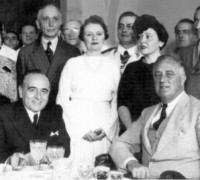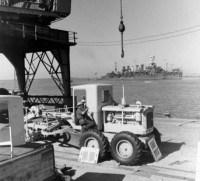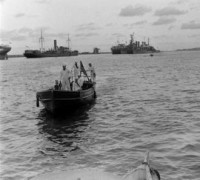MILITARY RELATIONS WITH BRAZIL BEFORE PEARL HARBOR - BRAZIL X USA MILITARY RELATIONS
5)ARMY QUEST FOR ACTION
Brazil's failure to obtain any appreciable quantity of American munitions in 1941, and Brazilian opposition to the entry of United States Army forces into the Natal area, should not obscure the many ways in which the United States and Brazil did cooperate in hemisphere defense measures before Pearl Harbor. First and foremost, Brazil had approved the construction of eight military air bases, financed by the United States Government, in the Northeast.
Then, beginning in June 1941, it permitted transport planes to be ferried via Brazil to the British forces in Africa and the Middle East. Five months later, the Army Air Forces' Ferrying Command inaugurated its own South Atlantic air transport service by way of Brazil to Cairo. In the autumn of 1941, as Ambassador Caffery subsequently observed, Brazil freely permitted United States noncombat aircraft to visit Brazil, to fly over Brazilian territory, and to use Brazilian airfields while in transit to Africa and elsewhere. Beginning in June 1941 also, surface vessels of the Navy's South Atlantic patrol force began to use the ports of Recife and Bahia as operating bases.
During the summer and autumn of 1941, as noted above, Brazil reversed its traditional military policy of keeping almost all of its armed forces in the south and began to build up garrisons in the Northeast to protect the vital air and naval installations taking shape there. Positive actions of a nonmilitary character included the suppression of German, Italian, and Japanese language newspapers and control of exports to insure that strategic materials went to the United States instead of to the Axis Powers.
The Army's Brazilian experts appreciated the extent of Brazil's cooperation and recognized that Brazilian military as well as civilian sentiment was overwhelmingly pro-United States and anti-Axis, but they also believed that Northeast Brazil needed much stronger military protection than it had in the autumn of 1941. The Army planners in Washington wished that the military negotiations with Brazil could be put on a higher plane than a mere bargaining for concessions.
They wanted the United States Government "to demonstrate that the measures of cooperation asked of Brazil [were] not to be regarded as concessions made to us but rather as contributions to hemisphere defense, and . . . to convince the Brazilian people of the existence of an actual menace to their future independence and of the necessity of their making frequent contributions to hemisphere defense." The difficulty was that the Brazilians simply did not appreciate the design of the hemisphere defense measures that the United States wanted to execute, nor the reasons for it.
The Brazilian members of the joint Planning Group frankly told the United States members that the defense of Northeast Brazil appeared to be much more vital to the United States than to Brazil. As Mr. Caffery pointed out later, many Americans in the fall of 1941 "were blind to the imminent danger with which the United States was so acutely threatened," and "failed to appreciate that the President's tenet that material assistance to the peoples and nations fighting the Axis constituted, in fact, a defense of the United States."
This being the case, he continued, "it should readily be appreciated that the Brazilians, for their part, had precious little interest in implementing aid to Britain, much less succor to Red Russia."In order to persuade President Roosevelt to take a more forthright line of action toward Brazil, the Army planners in late August 1941 drafted a strong letter to be sent by Secretary of War Stimson to Secretary of State Hull. After reciting in some detail the Army's fruitless efforts to get its forces into Brazil, this letter concluded:
The time has arrived when this Government in the most formal manner should bring to the attention of the Brazilian Government the high importance to Brazil, to the United States, and to this entire Hemisphere, of preventing any Axis infiltration into or control of the northeast portion of Brazil and to insist that Brazil comply with the request of this Government for the entry of our security forces into her strategic northeast for the period of the emergency, a request that we deem imperative to make in the interests of our joint safety.
I judge this matter to be among the most important questions of foreign policy now confronting this nation, and as such, one which you, Secretary Knox and I should present jointly to the President as soon as his convenience will permit. Mr. Stimson signed this letter on 30 August and directed that a copy be sent to Secretary of the Navy Knox so that the War and Navy Departments would be in agreement before the matter was presented to Mr. Hull and then to the President.
On 31 August General Gerow, the Chief of the War Plans Division, flew to Hyde Park where he discussed the Brazilian situation with President Roosevelt. Three days later Mr. Knox assured the War Department that he would give it "every possible assistance in this matter." The Chief of Naval Operations reacted very differently to the War Department's proposal when General Marshall consulted him about it. Admiral Stark observed that the proposed action might hamper the Navy's current effort to expand its Brazilian operations to include the operation of patrol planes based on Brazilian ports.
As an alternative, Admiral Stark proposed that, as soon as Brazil agreed to the operation of Navy patrol planes, the Navy would ask for the protection of these same ports by Army pursuit planes, and after that for the privilege of putting Marine Corps detachments in to protect these planes, a proposal very similar to the one discussed by the Army and Navy planners during July. Admiral Stark also suggested that the Army use the good offices of Rear Adm. A.T. Beauregard, naval attaché at Rio, to advance its plans.
Over the objections of the Army planners, General Marshall and Secretary Stimson decided that they ought not to go ahead with the Army's Brazil proposal without Admiral Stark's concurrence. The Chief of Staff sent Admiral Stark a copy of the proposed Secretary of War-Secretary of State letter for transmission to Admiral Beauregard and suspended action on the original.
Not only was the Navy somewhat less than enthusiastic over the Army's security force plan for Brazil but also it apparently feared that the execution of the Army's plan might interfere with the Navy's own plans for South Atlantic operations. There certainly was little coordination between the Army and the Navy in connection with planning for Brazil in the fall of 1941.
When General Headquarters set to work in October on a detailed operations plan for Brazil, it had no information on current Navy plans for the area, nor did the naval liaison officer assigned to General Headquarters know anything about them. In the outline of information presently obtained by General Headquarters, the Navy indicated that in the event of a German move into Africa a major United States naval base would have to be established at Natal or at Maceió.
At the end of October the Navy Department insisted that Natal must become "a Naval Base and Naval Command." Admiral Beauregard in his discussions with Ambassador Caffery seems to have accepted the latter's opinion "that if any necessity exists for our Army moving in anywhere in Brazil or any garrisons established, it can only be done by diplomatic means and not between the Armies as the Brazilian Army is dead set against our coming in."
At the end of November Admiral Stark again asked "that the Army postpone further requests to base troops or planes in Brazil until the Navy is fully established there." In the meantime, the Army planners viewed the Brazilian situation with growing concern. The War Plans Division estimate of 19 September, compiled in connection with the Victory Program planning, of what the Army could do with its existing means to meet the Axis challenge, put the Brazil operation first and stated that if Germany moved into West Africa and its adjacent islands, United States Army forces would have to be sent to the Natal area.
The October War Department Strategic Estimate accorded the same top priority to a Brazilian operation in its listing of the eleven most "profitable lines of action" then open to the United States. The Victory Program estimate itself called for a task force of 86,646 United States ground troops for Brazil.Colonel Ridgway summarized the Army planners' point of view when he stated: Brazil is the most vital point in our outpost system for our future security against the long range plans for aggression of the Axis.
By acceding to the Brazilian Government argument that there is no immediate threat to Brazil, we overlook the rapidity with which our military situation can deteriorate. The sudden collapse of Russia, the eviction of Britain from the Middle East, the eruption of Axis forces down the northwest African coast and the possible concurrent reversal of Latin American opinion from pro-Ally to pro-Axis (hastened by the impact of German subversive efforts on the South American continent) might prove that we had cut our time factor too fine.
The objective of the War and Navy Departments therefore continues to be the placing of adequate United States security forces in northeast Brazil at the earliest practicable date. The obstacle of Brazilian sensitiveness to this relinquishment of sovereignty is well understood, but efforts must be intensified to surmount it. On 10 November General Gerow advised the Chief of Staff: "I believe the need for placing our armed security forces in Brazil is greater now than it was last summer."
He and General Arnold of the Air Forces therefore recommended the dispatch of the long-suspended letter to Mr. Hull. General Marshall had already sent a modified version of the letter to Mr. Welles, and he still preferred to let the Navy continue to take the lead in Brazil. When the Chief of Staff learned on 12 November that Brazil had agreed to open its ports to Navy patrol planes, he told Mr. Welles that it was very important to get a few Army planes, guarded by Marine detachments, to Natal and Maceió as quickly as possible.
Once they were there, their number could be gradually increased. Mr. Welles thought that United States armed guards "could be gotten in there in some guise, possibly as technical assistants"--a scheme that was to be put into practice a few weeks later after the United States went to war. General Marshall had good reason to act on the Brazil problem with more caution than his planners counseled during the fall of 1941.
The Army's own representative at Rio, General Miller, believed that the Navy approach was the best. He urged that "the occupation of Brazilian territory by United States armed forces . . . be delayed as much as the military situation will permit and until the people of Brazil have been awakened to the danger confronting them." General Marshall must also have been impressed by President Roosevelt's reluctance to give any firm backing to the Army's security force plan for Brazil.
Early in November the Chief of Staff learned both from the War Plans Division in Washington and from General Miller in Rio that the President had never formally requested that Brazil allow United States Army forces to enter its territory. Ambassador Caffery pointedly told General Miller that "the President is not supporting the Army's stand in this matter."
Both the President and the Chief of Staff knew that President Vargas and Foreign Minister Aranha had been trying since August to mold Brazilian opinion in favor of more open collaboration with the United States. The Brazilian Government in working toward this end had to take into account the determined opposition of Brazilian Army leaders to the entry of American ground forces.
It also had to recognize the ease with which pro-Nazi elements could fan popular sentiment against any American move that could be interpreted as imperialistic or an infringement on Brazilian sovereignty. Therefore, the Brazilian President and his Foreign Minister had to move slowly, but by early November they were openly announcing their intention of supporting the United States should it be drawn into the war. Ambassador Caffery was told that Brazil would immediately ask for United States Army assistance if German forces moved into Portugal or northwestern Africa.
The outlook for closer Brazilian-American cooperation and for the achievement of the United States Army's objectives in Brazil momentarily worsened during November, partly because pro-Nazi elements became bolder as the German armies approached Moscow, partly because General Miller, through no fault of his own, had become persona non grata to the Brazilian Chief of Staff. President Vargas was sufficiently worried to request that the United States Navy postpone its plan for operating patrol planes from Brazilian ports.
On 27 November Brazil finally granted a clearance for operation of the planes, and on 11 December the first naval patrol squadron reached Brazilian ports. The operation that General Marshall in Washington and General Miller in Rio had looked upon as the opening wedge for gaining Brazilian consent to the entry of United States Army air and ground forces thus began after the United States was fully in the war, and under circumstances that gave the Brazilian bulge a new and unforeseen significance.
Formatted by Patrick Clancey. HyperWar Foundation.



